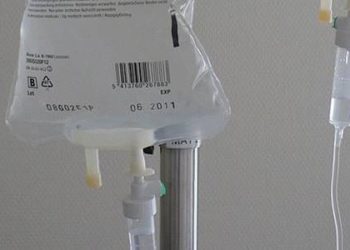Glucose control by closed-loop therapy in type 1 diabetes does not decrease C-peptide secretion
1. In type 1 diabetes patients, C-peptide levels were not significantly different between a closed-loop treatment group compared to controls at 12 months.
2. Participants on closed-loop treatment had a higher percentage of time in the target glucose range than the control group.
Evidence Rating Level: 1 (Excellent)
Study Rundown: C-peptide secretion is a marker of residual functioning beta cells in type 1 diabetes. It is also predictive of glycemic control and microvascular complications. A hybrid closed loop therapy system automatically titrates insulin to blood sugar levels identified within the same device, which leads to better glycemic control. The present study compared C-peptide levels and glycemic indices in diabetes patients randomized to either closed-loop therapy or control groups. C-peptide levels at 12 months were not significantly different between the treatment and control groups. Measured C-peptide levels decreased in both trial groups during the study. The percentage of time within the target glucose range was higher in the closed-loop group than in the control group. Further, the time spent in a hyperglycemic state, glucose over 180 mg, was lower in the closed-loop group than in the control group. The total, basal, and bolus insulin doses were similar between both groups. Additionally, both groups had similar blood pressure, lipid profile, and body mass index (BMI). This multicenter, randomized control trial had a representative trial population and real-world environment for youth with type 1 diabetes, which strengthens the study results for generalizability. The study suggests that intensive glycemic control is important irrespective of the effect on C-peptide secretion.
Click to read the study in NEJM
Relevant Reading: A randomized trial of closed-loop control in children with type 1 diabetes
In-Depth [randomized control trial]: The Closed Loop from Onset in Type 1 Diabetes (CLOuD) trial is a multicenter, open-label, parallel-group, randomized trial comparing a closed-loop insulin delivery system and standard insulin therapy (n=97). Participants required a diagnosis of type 1 diabetes within the past 21 days and were between ages 10 to 16.9. Participants were followed for 24 months and had follow-up visits in 3-month intervals. The primary endpoint was the mean area under the receiver operating characteristic curve (AUC) for the plasma C-peptide level at 12 months after diagnosis. The AUC for C-peptide levels between both groups was not significantly different; the mean adjusted difference was -0.06 pmol per milliliter (95% Confidence interval [CI], -0.14 to 0.03). The percentage of time within the target glucose range at 12 months was higher in the closed-loop group (64±14%) than in the control group (54±23%; 95% CI, 2 to 7). At 24 months, no significant difference was seen between groups for the AUC for C-peptide (95% CI, -0.14 to 0.06). The percentage of time in the target glucose range at 12 months was higher in the closed-loop group than in the control group (95% CI, 6 to 21). The glycated hemoglobin was 11 mmol per mole in the closed-loop group and 15 mmol per mole in the control group at 24 months (95% CI, 7 to 15). The mean difference in the percentage of time with glucose levels lower than 70 mg per deciliter was 2.8% (95% CI, -0.6 to 6.2). A total of five cases of severe hypoglycemia were recorded, which involved 3 participants in the closed-loop group and 1 in the control group. In summary, residual C-peptide secretion may not be impacted by glycemic control.
Image: PD
©2022 2 Minute Medicine, Inc. All rights reserved. No works may be reproduced without expressed written consent from 2 Minute Medicine, Inc. Inquire about licensing here. No article should be construed as medical advice and is not intended as such by the authors or by 2 Minute Medicine, Inc.









